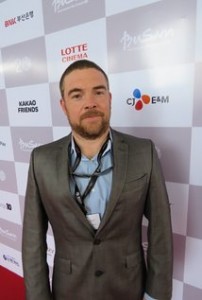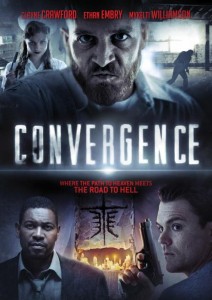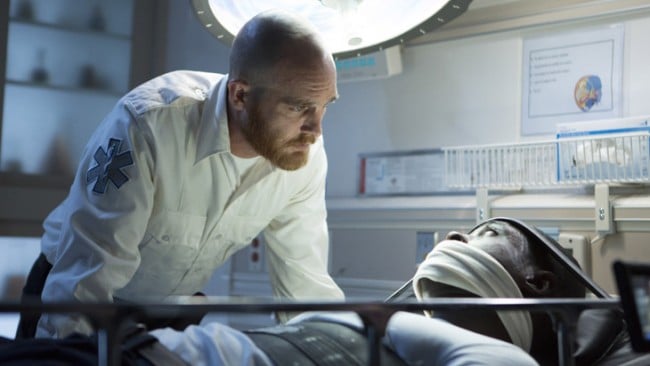 Drew Hall (‘Sons of Liberty’) is the director of the recently released supernatural thriller ‘Convergence’ that follows Clayne Crawford (‘A Walk to Remember’,’Jericho’) as Ben who wakes up in a hospital after a bombing who learns that life is no longer what he thought it was. Recently he had a bit of time to talk to ScienceFiction.com about the film.
Drew Hall (‘Sons of Liberty’) is the director of the recently released supernatural thriller ‘Convergence’ that follows Clayne Crawford (‘A Walk to Remember’,’Jericho’) as Ben who wakes up in a hospital after a bombing who learns that life is no longer what he thought it was. Recently he had a bit of time to talk to ScienceFiction.com about the film.
Science Fiction (SF): Drew, thanks for joining us today. First if you could share with our readers what ‘Convergence’ is about for those who are unfamiliar with the film.
Drew Hall (DH): Well ‘Convergence’ is a bit of a tricky movie to describe without spoiling the fun. It is a psychological thriller about an arson detective who while investigating a case ends up in a hospital where he is haunted by strange shadow people and pursued by a religious zealot whose relationship to the case comes into question.
That’s the broad stroke kind of thing, but for me, ‘Convergence’ is a film about redemption and what is on the other side of redemption. I grew up a huge Bradbury fan and have always felt that the best science fiction is that which challenges its readers with questions of faith, humanity, and social implications. As a writer I simply wanted to make a film that rewarded viewers brave enough to follow through on the journey within ‘Convergence.’
SF: How did the time period you placed the story in affect the plot as well as filming the movie?
DH: Yeah, so there’s a bit a time travel element to it without giving anything away. The big concern for me was that if I were to have a villain like Daniel (Ethan Embry) I wanted to make sure that the history behind his convictions was accurate.
I grew up in the Southern U.S. and during the 80s and 90s there were some truly horrific acts of violence committed by domestic terrorists in the name of God. Many of these events occurred about 45 miles from my home, if not in my home town. Other events happened across the south like the 1996 bombing of Centennial Park in Atlanta. The person behind that attack was also linked to several pro-life attacks in the Southern US. Convergence does NOT take a viewpoint on the pro-life/pro-choice debate, but it does reflect upon the decades where these crimes occurred.
I eventually settled on 1999 because it felt like the most relatable year as odd as it sounds, but it is also a very identifiable year without the need of a graphic saying ‘1999’. I could just reference Y2K. Additionally, this time frame was around the peak of the aforementioned domestic terrorism.
 SF: Where did the idea for ‘Convergence’ come from and what inspired you to create it?
SF: Where did the idea for ‘Convergence’ come from and what inspired you to create it?
DH: The origin of ‘Convergence’ stems from several factors cumulating at the same time. My first three films were work for hire and just about the time we were finishing ‘Sons of Liberty’, the executive producer asked me if I had any horror or thriller scripts. I told him yes, but was actually bluffing. I knew I could craft something…but there were no scripts hidden away in my Dropbox.
Several weeks later I learned that a wonderful human being and very dear friend, Ben Walls, had lost his battle with cancer. I was devastated and, as is typical for me, I turned to writing as catharsis. I don’t really even remember what I wrote, but the character of Ben Walls is obviously named after my friend.
Meanwhile, I’m rummaging around my dusty brain trying to think of what actually scares me. Aside from greys, most creature horror doesn’t do much, but psychological horror definitely works for me. That’s where the history element comes into play regarding the anti-abortion terrorism. It completely terrified me as a kid. So in a way I had found a villain.
Last piece of the puzzle is the very simple fact that one day I forgot my glasses. My daughter (same kid you see in ‘Convergence’) was just a baby and I had been arguing with my wife over something probably stupid. I stopped just outside of the garage and there was my wife holding my glasses. It was another egg on face moment in a long line of foot in mouth situations.
Those were the catalysts behind the story. I write 2 hours a day so these ideas were always in the back of my mind influencing the story as I mapped it out.
SF: A lot of horror includes humor or cheap thrills these days which you thankfully didn’t rely upon. Was that a premediated choice?
DH: I watch a lot of horror movies as my wife is a big fan and, as I mentioned, the ones that truly scare me are more psychological than creature feature. To this day I think The Shining is one of the most terrifying motion pictures ever made. It’s the combination of huge disorientation juxtaposed in a single location and the events which occur to a seemingly innocent family that truly rattles my brain. I never saw the film in my youth and only watched it in its entirety after writing ‘Convergence’ – again because my horror fangirl wife told me to. Yeah it totally trashed my sleep cycle.
‘Alien’ has that same sort of vibe, though we have a creature, it’s the atmosphere of the scenes that truly makes that film terrifying. Don’t get me wrong, though, ‘The Descent’ has a jump scare that literally made me curse and rear back in terror. There will always be a time and place for those sort of scenes, but audiences, in my opinion, are looking for those so why not revisit the techniques of the masters of tension – Hitchcock, Kubrick, Friedkin.

SF: There were clues throughout the story that were subtle in many instances but there. How important was it to include hints at what was to come and give those who were really paying attention a chance to figure things out?
DH: Rewarding the audience is something I love about filmmaking. They have all got so sophisticated and accustom to film language, so the fun in a good thriller is seeing how long you hide the answers in plain sight. There are a few story elements that I knew were not worth hiding too much, but there is one in particular that comes right out of nowhere. It is risky, non-conventional, and for most people, an incredibly fun experience when it happens.
With any film that I am investing my time in – meaning watching – I do my best to honor the work of the cast, crew, and director by paying attention. Somebody somewhere put in a tremendous amount of time and energy to create the film and the least I can do is honor their efforts with investing myself into their world. The movies that ‘get’ me are the ones where I see the clues, but cannot quite arrange them into a cohesive solution. I’m a fan of the popcorn movie, but those don’t typically have me leaving the theater still thinking about what I just saw.
SF: Now that it is out in the wild, is there any changes you would have made to the final cut?
DH: That’s a tough one. My dad is adamant that the film needs a bit of a happier ending. Something kind of uplifting. Friends and colleagues always wanted more of the “post twist” sequence stuff – which we actually have. We shot a webseries that is in sync with the events of the film from a different perspective – it’s really cool. That said – my first draft of the script was actually TWO films that met in the middle. So acts 1 and 2 of each film was from a different perspective, but act 3 was the same for each of them. They converged.
The only major element I wish I could have gotten was the original concept for the explosion. It was this really insane slow motion, 3D flyby of the explosion as it was happening. The titles were actually made up of debris and other bits tumbling through the air. It would have been EPIC, but alas that shot was quoted at a 1/4 of our budget, which means NOT GONNA HAPPEN.
SF: How did you originally get into filmmaking?
DH: My parents raised me seeing a ton of movies, mostly classics with Jimmy Stewart and Cary Grant – and Star Wars. The excitement we had as a family watching movies was something I wanted to share with others. So I started shooting my own on our VHS bag camera. Eventually my late grandfather gave me a Super 8mm camera. Apparently it was loaded so when I opened the door I flashed the mag, but I was hooked on this idea of making my own versions of Star Wars, Indiana Jones, and WWF movies – like sequels. Of course the WWF stuff was just us pretending to be pro-wrestlers.
I am an only child and movies were a gateway towards exploring worlds. With friends around I had actors and when the actors went home I was an editor, writer, or producer in search of the next Saturday afternoon adventure.
SF: Do you have any advice to share with newer filmmakers or those looking to enter the profession?
DH: Two things I have learned that I wish I would have known before entering filmmaking as a profession.
Failure is very much part of the process. One might say it is a rite of passage. The key is to fail forward, just be conscious of where you’ll be landing.
Industry. Business. Product. Whatever term suits you, just know that in the end filmmaking is a business if you want to get paid for your works. It’s not just about making a film – which some liken to a product – it is crafting a story or concept in a way that will hopefully land you another opportunity. Just like any business the relationships you forge are truly the key to success. The whole “who you know” is very true, but it can also work in your favor as “who knows you”. Thoughtful and respectful treatment of cast and crew is paramount to success.
SF: What other projects do you have in the pipeline that you can share?
DH: We – Frame 29 Films – have a couple of projects in development at the moment. One is a supernatural thriller about the urban legend of “Black Eyed Kids”. It is really, really creepy.
We have a Sasquatch comedy coming out at some point with a terrifically funny cast.
And then there’s our baby ‘Aether: The Rise of Specter.’ It is our dream project. Epic science fiction that people describe as a mix of Mad Max and Firefly. That project has so many cool science fiction legends attached to it as creatives. Oscar Winner Alex Funke, ASC, is a VFX pioneer and his work on The Lord of The Rings and The Hobbit series is awesome. Blade Runner’s art director David L. Snyder is the production designer for Aether. Kim Bailey who helped create one of my all-time favorite shows, Space Above and Beyond, designed the airships in the Aether’verse. We are really lucky because there are even more creative geniuses on Aether. You can find out more at http://www.AetherPrologue.com.
SF: Is there anything else that you would like to share with our readers?
DH: Thank you so much for taking the time to check out ‘Convergence’ – and if you haven’t yet avoid everything and just sit down and watch it. I think you’ll enjoy it greatly. Lastly, anybody got any ideas on how we can bring back ‘Firefly’? I really miss my Browncoats.
